Abstract
A policy of Helicobacter pylori eradication in patients with duodenal ulceration on long-term acid-suppressing therapy was evaluated in a prospective study amongst a general practice population, with particular reference to economic and quality-of-life benefits. One hundred and sixty-eight patients on long-term acid-suppressing therapy had chronic duodenal ulcer disease of whom 88 were eligible for the study; 45 patients attended for review, with 42 testing positive for H pylori (as assessed by 13C-urea breath test). The median duration of acid-suppressing therapy was six years (maximum 15 years); 47.6% of the patients were using additional antacids and 80.9% still experienced epigastric discomfort. Two-thirds (28/42) of the patients eradicated H pylori. Successful eradication was associated with a highly significant reduction in all symptoms. At 12 months follow-up, heartburn had decreased from 28.7% to 7.1%, epigastric discomfort from 75% to 3.6%, nausea from 32.1% to 0% and wind from 50% to 0%. Of the patients that eradicated H pylori 96.4% reported an improvement in their general health compared to none of those that remained H pylori positive. Successful H pylori eradication therapy scored higher on satisfaction ratings than long-term acid-suppressing therapy. Eradication of H pylori resulted in 27/28 patients being able to discontinue acid-suppressing therapy, representing a 5.8% reduction in the use of such drugs per year in the local general practice population. A policy of H pylori eradication in chronic duodenal ulcer disease reduces the use of long-term acid-suppression therapy in general practice. This has important financial implications as well as offering considerable symptomatic benefits to the patients and improving their quality of life.
Full text
PDF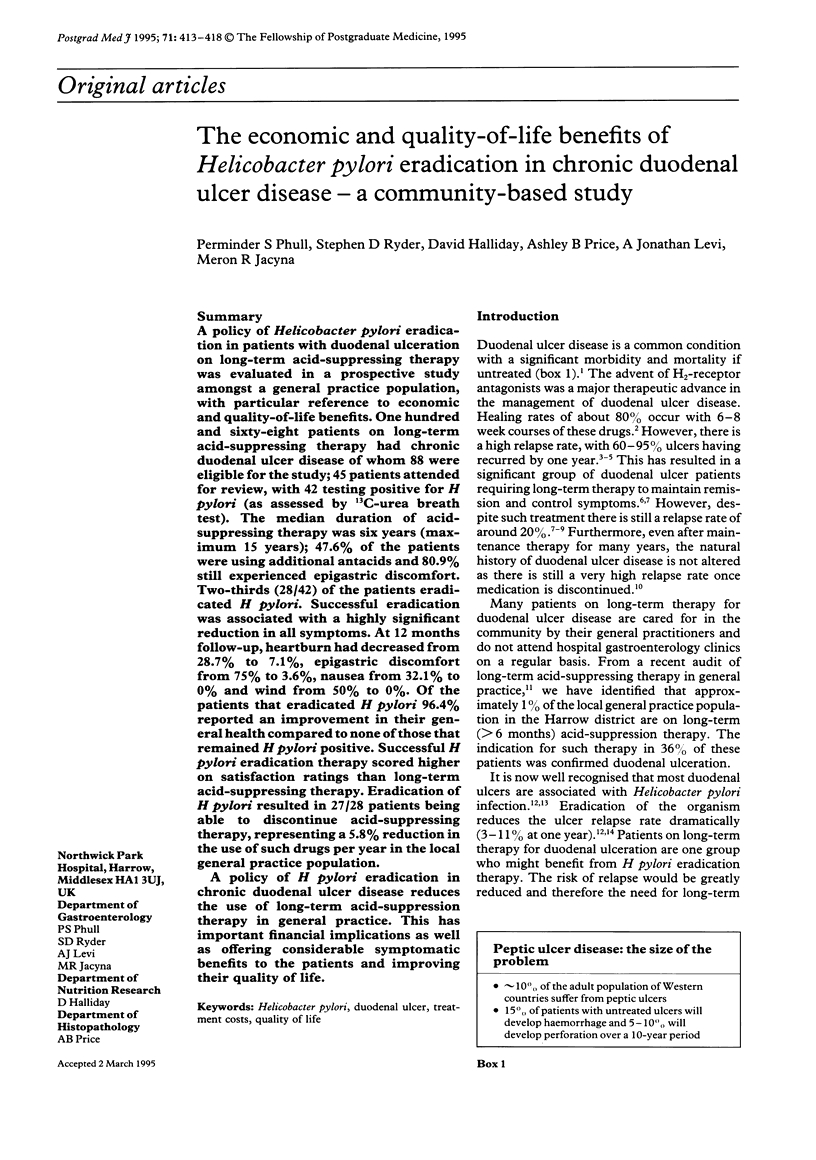
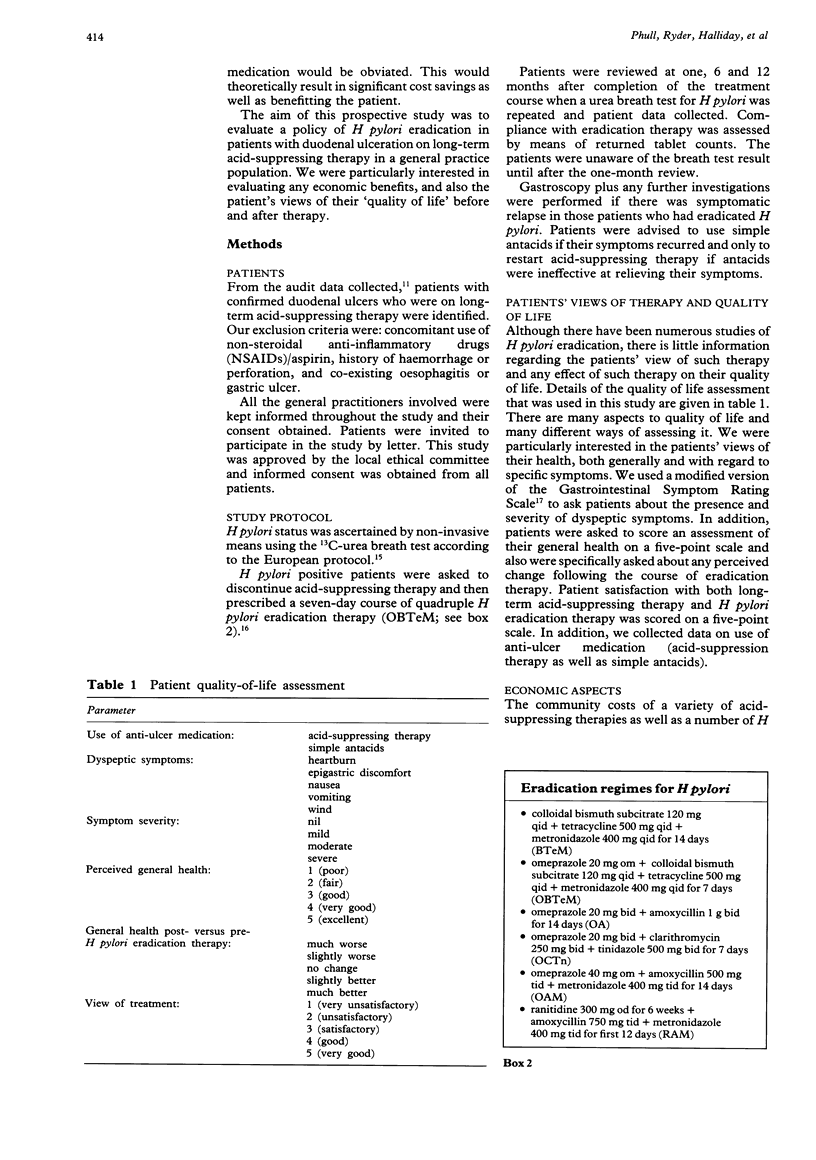
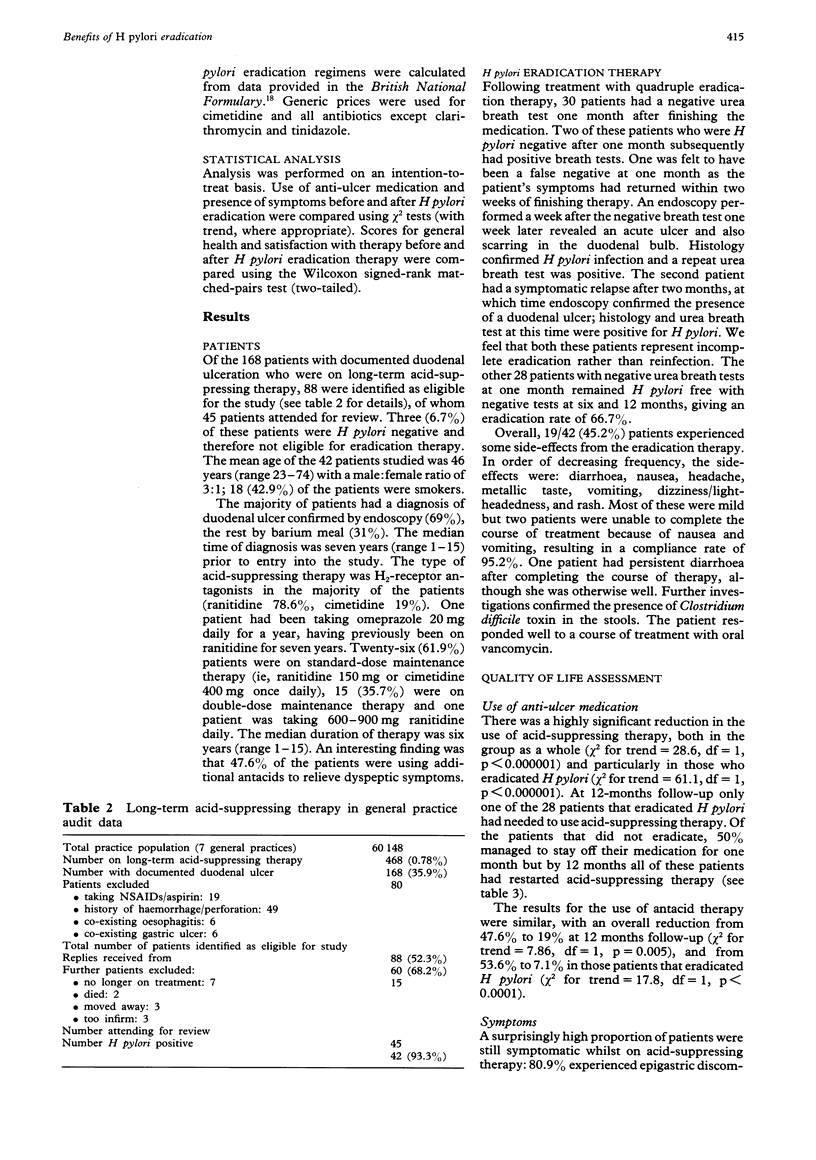
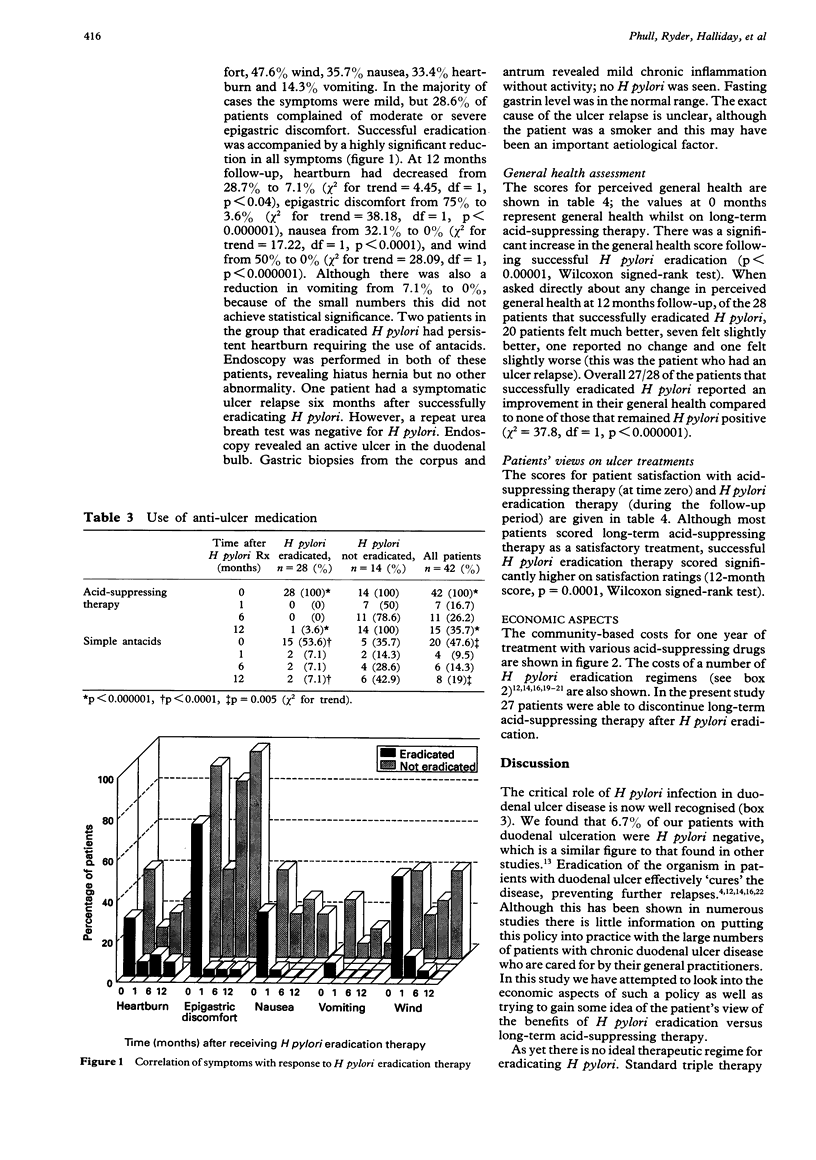
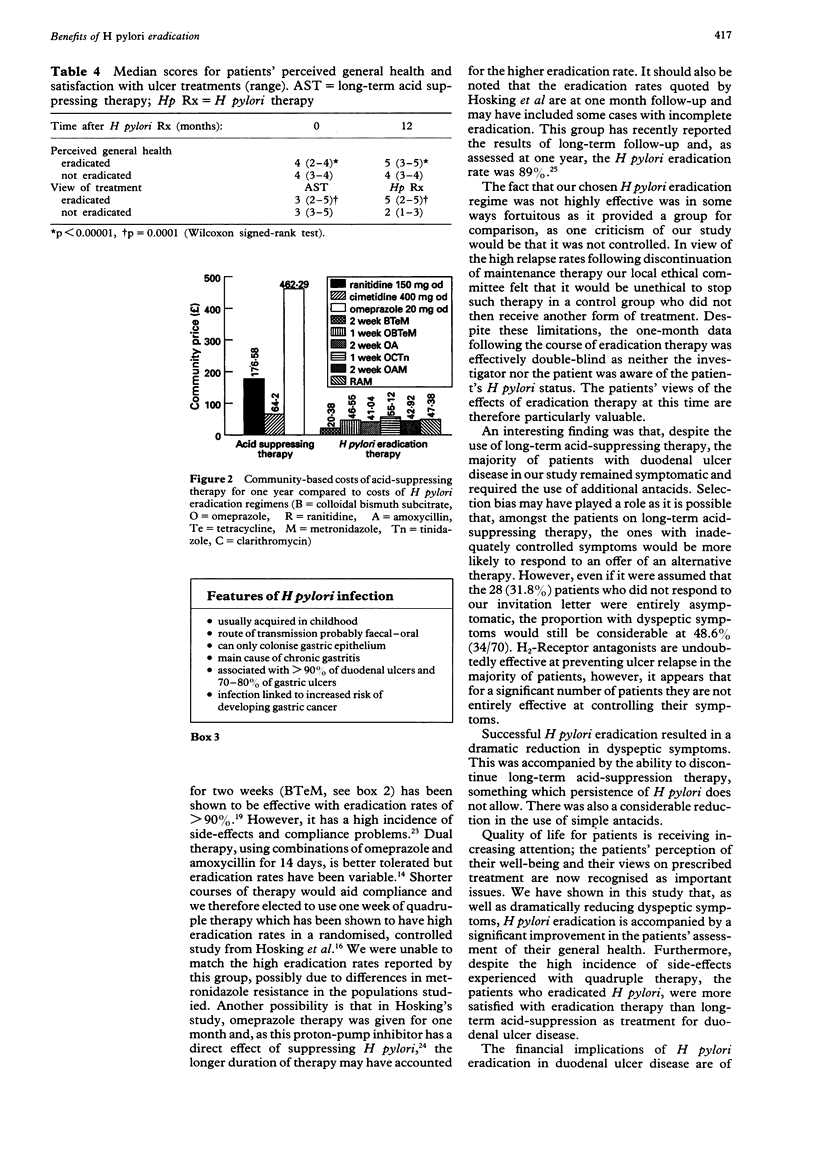
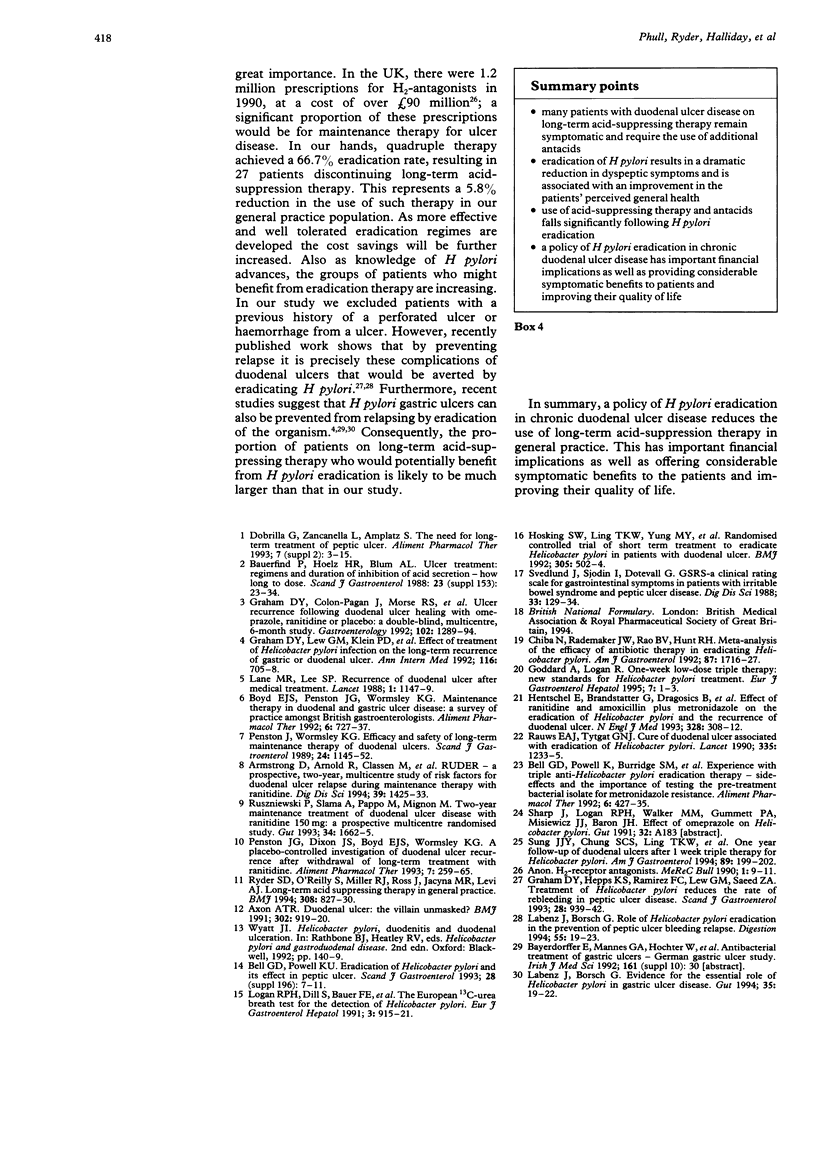
Selected References
These references are in PubMed. This may not be the complete list of references from this article.
- Armstrong D., Arnold R., Classen M., Fischer M., Goebell H., Schepp W., Blum A. L. RUDER--a prospective, two-year, multicenter study of risk factors for duodenal ulcer relapse during maintenance therapy with ranitidine. RUDER Study Group. Dig Dis Sci. 1994 Jul;39(7):1425–1433. doi: 10.1007/BF02088044. [DOI] [PubMed] [Google Scholar]
- Axon A. R. Duodenal ulcer: the villain unmasked? BMJ. 1991 Apr 20;302(6782):919–921. doi: 10.1136/bmj.302.6782.919. [DOI] [PMC free article] [PubMed] [Google Scholar]
- Bell G. D., Powell K. U. Eradication of Helicobacter pylori and its effect in peptic ulcer disease. Scand J Gastroenterol Suppl. 1993;196:7–11. doi: 10.3109/00365529309098334. [DOI] [PubMed] [Google Scholar]
- Bell G. D., Powell K., Burridge S. M., Pallecaros A., Jones P. H., Gant P. W., Harrison G., Trowell J. E. Experience with 'triple' anti-Helicobacter pylori eradication therapy: side effects and the importance of testing the pre-treatment bacterial isolate for metronidazole resistance. Aliment Pharmacol Ther. 1992 Aug;6(4):427–435. doi: 10.1111/j.1365-2036.1992.tb00556.x. [DOI] [PubMed] [Google Scholar]
- Boyd E. J., Penston J. G., Wormsley K. G. Maintenance therapy in duodenal and gastric ulcer disease: survey of practice amongst British gastroenterologists. Aliment Pharmacol Ther. 1992 Dec;6(6):727–737. doi: 10.1111/j.1365-2036.1992.tb00737.x. [DOI] [PubMed] [Google Scholar]
- Chiba N., Rao B. V., Rademaker J. W., Hunt R. H. Meta-analysis of the efficacy of antibiotic therapy in eradicating Helicobacter pylori. Am J Gastroenterol. 1992 Dec;87(12):1716–1727. [PubMed] [Google Scholar]
- Dobrilla G., Zancanella L., Amplatz S. The need for long-term treatment of peptic ulcer. Aliment Pharmacol Ther. 1993;7 (Suppl 2):3–15. doi: 10.1111/j.1365-2036.1993.tb00594.x. [DOI] [PubMed] [Google Scholar]
- Goddard A., Logan R. One-week low-dose triple therapy: new standards for Helicobacter pylori treatment. Eur J Gastroenterol Hepatol. 1995 Jan;7(1):1–3. [PubMed] [Google Scholar]
- Graham D. Y., Colon-Pagan J., Morse R. S., Johnson T. L., Walsh J. H., McCullough A. J., Marks J. W., Sklar M., Stone R. C., Cagliola A. J. Ulcer recurrence following duodenal ulcer healing with omeprazole, ranitidine, or placebo: a double-blind, multicenter, 6-month study. The Omeprazole Duodenal Ulcer Study Group. Gastroenterology. 1992 Apr;102(4 Pt 1):1289–1294. [PubMed] [Google Scholar]
- Graham D. Y., Hepps K. S., Ramirez F. C., Lew G. M., Saeed Z. A. Treatment of Helicobacter pylori reduces the rate of rebleeding in peptic ulcer disease. Scand J Gastroenterol. 1993 Nov;28(11):939–942. doi: 10.3109/00365529309098288. [DOI] [PubMed] [Google Scholar]
- Graham D. Y., Lew G. M., Klein P. D., Evans D. G., Evans D. J., Jr, Saeed Z. A., Malaty H. M. Effect of treatment of Helicobacter pylori infection on the long-term recurrence of gastric or duodenal ulcer. A randomized, controlled study. Ann Intern Med. 1992 May 1;116(9):705–708. doi: 10.7326/0003-4819-116-9-705. [DOI] [PubMed] [Google Scholar]
- Hentschel E., Brandstätter G., Dragosics B., Hirschl A. M., Nemec H., Schütze K., Taufer M., Wurzer H. Effect of ranitidine and amoxicillin plus metronidazole on the eradication of Helicobacter pylori and the recurrence of duodenal ulcer. N Engl J Med. 1993 Feb 4;328(5):308–312. doi: 10.1056/NEJM199302043280503. [DOI] [PubMed] [Google Scholar]
- Hosking S. W., Ling T. K., Yung M. Y., Cheng A., Chung S. C., Leung J. W., Li A. K. Randomised controlled trial of short term treatment to eradicate Helicobacter pylori in patients with duodenal ulcer. BMJ. 1992 Aug 29;305(6852):502–504. doi: 10.1136/bmj.305.6852.502. [DOI] [PMC free article] [PubMed] [Google Scholar]
- Labenz J., Börsch G. Evidence for the essential role of Helicobacter pylori in gastric ulcer disease. Gut. 1994 Jan;35(1):19–22. doi: 10.1136/gut.35.1.19. [DOI] [PMC free article] [PubMed] [Google Scholar]
- Labenz J., Börsch G. Role of Helicobacter pylori eradication in the prevention of peptic ulcer bleeding relapse. Digestion. 1994;55(1):19–23. doi: 10.1159/000201117. [DOI] [PubMed] [Google Scholar]
- Lane M. R., Lee S. P. Recurrence of duodenal ulcer after medical treatment. Lancet. 1988 May 21;1(8595):1147–1149. doi: 10.1016/s0140-6736(88)91961-7. [DOI] [PubMed] [Google Scholar]
- Penston J. G., Dixon J. S., Boyd E. J., Wormsley K. G. A placebo-controlled investigation of duodenal ulcer recurrence after withdrawal of long-term treatment with ranitidine. Aliment Pharmacol Ther. 1993 Jun;7(3):259–265. doi: 10.1111/j.1365-2036.1993.tb00096.x. [DOI] [PubMed] [Google Scholar]
- Penston J., Wormsley K. G. Efficacy and safety of long-term maintenance therapy of duodenal ulcers. Scand J Gastroenterol. 1989 Nov;24(9):1145–1152. doi: 10.3109/00365528909089269. [DOI] [PubMed] [Google Scholar]
- Rauws E. A., Tytgat G. N. Cure of duodenal ulcer associated with eradication of Helicobacter pylori. Lancet. 1990 May 26;335(8700):1233–1235. doi: 10.1016/0140-6736(90)91301-p. [DOI] [PubMed] [Google Scholar]
- Ruszniewski P., Slama A., Pappo M., Mignon M. Two year maintenance treatment of duodenal ulcer disease with ranitidine 150 mg: a prospective multicentre randomised study. GEMUD (Groupe d'Etude de la Maladie Ulcéreuse Duodénale). Gut. 1993 Dec;34(12):1662–1665. doi: 10.1136/gut.34.12.1662. [DOI] [PMC free article] [PubMed] [Google Scholar]
- Ryder S. D., O'Reilly S., Miller R. J., Ross J., Jacyna M. R., Levi A. J. Long term acid suppressing treatment in general practice. BMJ. 1994 Mar 26;308(6932):827–830. doi: 10.1136/bmj.308.6932.827. [DOI] [PMC free article] [PubMed] [Google Scholar]
- Sung J. J., Chung S. C., Ling T. K., Yung M. Y., Cheng A. F., Hosking S. W., Li A. K. One-year follow-up of duodenal ulcers after 1-wk triple therapy for Helicobacter pylori. Am J Gastroenterol. 1994 Feb;89(2):199–202. [PubMed] [Google Scholar]
- Svedlund J., Sjödin I., Dotevall G. GSRS--a clinical rating scale for gastrointestinal symptoms in patients with irritable bowel syndrome and peptic ulcer disease. Dig Dis Sci. 1988 Feb;33(2):129–134. doi: 10.1007/BF01535722. [DOI] [PubMed] [Google Scholar]


